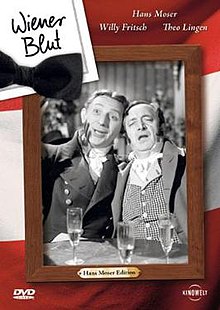
Hans Moser was an Austrian actor who, during his long career, from the 1920s up to his death, mainly played in comedy films. He was particularly associated with the genre of the Wiener Film. Moser appeared in over 150 films.

Wiener Blut Op. 354 is a waltz by Johann Strauss II first performed by the composer on 22 April 1873. The new dedication waltz was to celebrate the wedding of the Emperor Franz Joseph I's daughter Archduchess Gisela Louise Maria and Prince Leopold of Bavaria. However, the waltz was also chiefly noted by Strauss' biographers as the début of Strauss with the Vienna Philharmonic Orchestra where for many years, the Philharmonic had dismissed any association with the 'Waltz King' as it had not wished to be associated with mere 'light' or 'pops' music. The festival ball celebrating the event was held at the Musikverein Hall which is the venue for the present day Neujahrskonzert.

Wiener Blut is an 1899 operetta named after Johann Strauss II's eponymous 1873 waltz. It was made with Strauss' approval, but without his participation. Its score reuses music he wrote for other works along with some music by his brother Josef Strauss; the job of compilation went to Adolf Müller. Its libretto is by Victor Léon and Leo Stein. The setting is the Congress of Vienna. Strauss may have seen a draft of the work, but he died a few months before its 26 October premiere at Vienna's Carltheater.

Heinrich Wilhelm "Heinz" Rühmann was a German film actor who appeared in over 100 films between 1926 and 1993. He is one of the most famous and popular German actors of the 20th century, and is considered a German film legend. Rühmann is best known for playing the part of a comic ordinary citizen in film comedies such as Three from the Filling Station and The Punch Bowl. During his later years, he was also a respected character actor in films such as The Captain from Köpenick and It Happened in Broad Daylight. His only English-speaking movie was Ship of Fools in 1964.

Karl Farkas was an Austrian actor and cabaret performer.
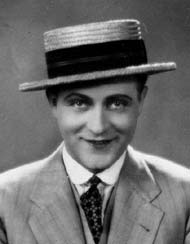
Willy Fritsch was a German theater and film actor, a popular leading man and character actor from the silent-film era to the early 1960s.
E. W. Emo was an Austrian film director.

The Mozart Medal of the Mozartgemeinde Wien was a music award named after Wolfgang Amadeus Mozart.

Theo Lingen, born Franz Theodor Schmitz, was a German actor, film director and screenwriter. He appeared in more than 230 films between 1929 and 1978, and directed 21 films between 1936 and 1960.
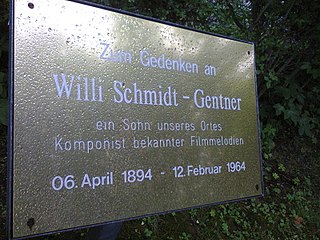
Willy Schmidt-Gentner was one of the most successful German composers of film music in the history of German-language cinema. He moved to Vienna in 1933. At his most productive, he scored up to 10 films a year, including numerous classics and masterpieces of the German and Austrian cinema.

Wiener Film is an Austrian film genre, consisting of a combination of comedy, romance and melodrama in a historical setting, mostly, and typically, the Vienna of the late 19th and early 20th centuries. The Wiener Film genre was in production between the 1920s and the 1950s, with the 1930s as its high period.
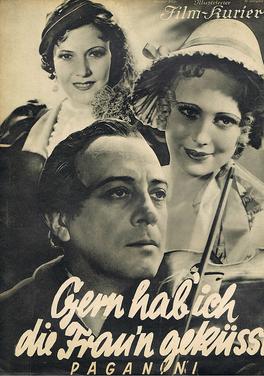
Paganini or I Liked Kissing Women is a 1934 German operetta film directed by E. W. Emo and starring Iván Petrovich, Eliza Illiard, and Theo Lingen. It is an adaptation of Franz Lehár's 1925 operetta Paganini.
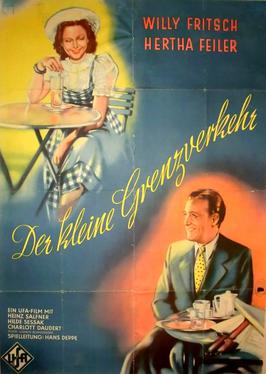
A Salzburg Comedy or Little Border Traffic is a 1943 German comedy film directed by Hans Deppe and starring Willy Fritsch, Hertha Feiler and Heinz Salfner. Erich Kästner wrote the screenplay based on one of his own novels. As he had been blacklisted by the Nazi Party he used the pseudonym Berhold Bürger. The novel was again adapted for the 1957 film Salzburg Stories.

Vienna Tales is a 1940 musical comedy film directed by Géza von Bolváry and starring Marte Harell, Olly Holzmann, and Hans Moser. The film is set in Imperial Vienna at the beginning of the twentieth century. The film's sets were designed by Hans Ledersteger and Ernst Richter.
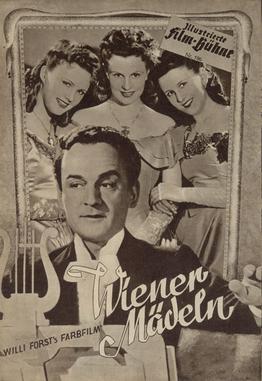
Viennese Girls is a 1945 historical musical film directed by Willi Forst and starring Forst, Anton Edthofer and Judith Holzmeister. The film was made by Wien-Film, a Vienna-based company set up after Austria had been incorporated into Greater Germany following the 1938 Anschluss. It was the third film in Forst's "Viennese Trilogy" which also included Operetta (1940) and Vienna Blood (1942). The film was finished in 1945, during the closing days of the Second World War. This led to severe delays in its release, which eventually took place in 1949 in two separate versions. One was released by the Soviet-backed Sovexport in the Eastern Bloc and the other by Forst.

Operetta is a 1940 German musical film directed by Willi Forst and starring Forst, Maria Holst and Dora Komar. The film was made by Wien-Film, a Vienna-based company set up after Austria had been incorporated into Greater Germany following the 1938 Anschluss. It is the first film in director Willi Forst's "Viennese Trilogy" followed by Vienna Blood (1942) and Viennese Girls (1945). The film portrays the life of Franz Jauner (1832–1900), a leading musical figure in the city. It is both an operetta film and a Wiener Film.
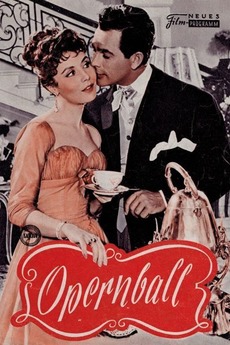
Opera Ball is a 1956 Austrian musical comedy film directed by Ernst Marischka and starring Johannes Heesters, Hertha Feiler and Josef Meinrad. Based on the 1898 operetta Der Opernball, it is part of the operetta film tradition. A previous film version had been made in 1939.
Fred Liewehr (1909–1993) was an Austrian stage and film actor.

Shame on You, Brigitte! is a 1952 Austrian comedy film directed by E.W. Emo and starring Heinz Rühmann, Hans Moser and Theo Lingen. It was later released in West Germany under the alternative title Wir werden das Kind schon schaukeln. It is based on the play Bubusch, a German-language version of a work by Hungarian writer Gábor Vaszary, which had previously been adapted into the 1943 German film Geliebter Schatz.
